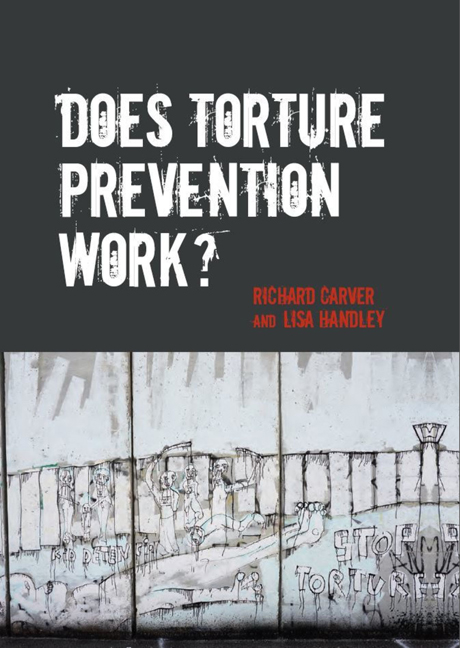Book contents
- Frontmatter
- Contents
- List of Tables
- List of Figures
- Foreword
- Acknowledgments
- Contributors
- 1 Introduction
- Overview and Findings
- 2 Studying Torture Prevention
- 3 Identifying What Preventive Mechanisms Work
- Prevention Sustained
- Prevention Stalled
- Prevention Expected
- Prevention Denied
- Conclusion and Future Strategies
- Bibliography
- Index
2 - Studying Torture Prevention
from Overview and Findings
- Frontmatter
- Contents
- List of Tables
- List of Figures
- Foreword
- Acknowledgments
- Contributors
- 1 Introduction
- Overview and Findings
- 2 Studying Torture Prevention
- 3 Identifying What Preventive Mechanisms Work
- Prevention Sustained
- Prevention Stalled
- Prevention Expected
- Prevention Denied
- Conclusion and Future Strategies
- Bibliography
- Index
Summary
Torture has been an object of study in several academic disciplines. There are philosophical and ethical discussions about whether torture can ever be justified. A large body of work examines the physical and mental effects of torture and the treatment of torture victims. More pertinently for this study, an extensive literature describes the prohibition of torture in international law and the obligations that states incur in customary law, international humanitarian law, and human rights law, notably in the two international preventive treaties, the Convention against Torture and Other Cruel, Inhuman or Degrading Treatment or Punishment (UN Convention against Torture, UNCAT) and its Optional Protocol (the Optional Protocol to the Convention against Torture and other Cruel, Inhuman or Degrading Treatment or Punishment, OPCAT), as well as the European Convention for the Prevention of Torture and Inhuman or Degrading Treatment or Punishment (European Convention for the Prevention of Torture). Psychological research is relevant to this study in that it has revealed that human beings have a propensity to torture in certain conditions, suggesting that rules and systems are the key to prevention.
Social scientific and historical research into the causes of torture, and factors that may prevent or mitigate it, has been rarer. There are, of course, notable exceptions to this statement. Langbein and others have traced the history of torture in Europe and attempted to account for its decline. Einolf emphasizes the degree to which democratic institutions have had a positive effect on the incidence of torture in the past two centuries; and pointed out that the theories that have explained its decline after the European Enlightenment do not explain its resurgence in the twentieth century. Rejali has documented the persistence of torture in modern democracies. Hathaway's work has prompted a flurry of studies that attempt to explain the impact (or, more usually, lack of impact) of UNCAT.
- Type
- Chapter
- Information
- Does Torture Prevention Work? , pp. 11 - 44Publisher: Liverpool University PressPrint publication year: 2016



